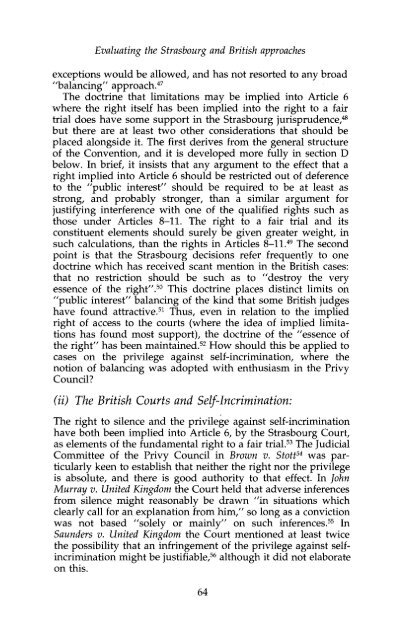Human Rights, Serious Crime and Criminal Procedure - College of ...
Human Rights, Serious Crime and Criminal Procedure - College of ...
Human Rights, Serious Crime and Criminal Procedure - College of ...
- No tags were found...
You also want an ePaper? Increase the reach of your titles
YUMPU automatically turns print PDFs into web optimized ePapers that Google loves.
Evaluating the Strasbourg <strong>and</strong> British approachesexceptions would be allowed, <strong>and</strong> has not resorted to any broad"balancing" approach. 47The doctrine that limitations may be implied into Article 6where the right itself has been implied into the right to a fairtrial does have some support in the Strasbourg jurisprudence, 48but there are at least two other considerations that should beplaced alongside it. The first derives from the general structure<strong>of</strong> the Convention, <strong>and</strong> it is developed more fully in section Dbelow. In brief, it insists that any argument to the effect that aright implied into Article 6 should be restricted out <strong>of</strong> deferenceto the "public interest" should be required to be at least asstrong, <strong>and</strong> probably stronger, than a similar argument forjustifying interference with one <strong>of</strong> the qualified rights such asthose under Articles 8-11. The right to a fair trial <strong>and</strong> itsconstituent elements should surely be given greater weight, insuch calculations, than the rights in Articles 8-11. 49 The secondpoint is that the Strasbourg decisions refer frequently to onedoctrine which has received scant mention in the British cases:that no restriction should be such as to "destroy the veryessence <strong>of</strong> the right". 50 This doctrine places distinct limits on"public interest" balancing <strong>of</strong> the kind that some British judgeshave found attractive. 51 Thus, even in relation to the impliedright <strong>of</strong> access to the courts (where the idea <strong>of</strong> implied limitationshas found most support), the doctrine <strong>of</strong> the "essence <strong>of</strong>the right" has been maintained. 52 How should this be applied tocases on the privilege against self-incrimination, where thenotion <strong>of</strong> balancing was adopted with enthusiasm in the PrivyCouncil?(ii) The British Courts <strong>and</strong> Self-incrimination:The right to silence <strong>and</strong> the privilege against self-incriminationhave both been implied into Article 6, by the Strasbourg Court,as elements <strong>of</strong> the fundamental right to a fair trial. 53 The JudicialCommittee <strong>of</strong> the Privy Council in Brown v. Stott 54 was particularlykeen to establish that neither the right nor the privilegeis absolute, <strong>and</strong> there is good authority to that effect. In JohnMurray v. United Kingdom the Court held that adverse inferencesfrom silence might reasonably be drawn "in situations whichclearly call for an explanation from him," so long as a convictionwas not based "solely or mainly" on such inferences. 55 InSaunders v. United Kingdom the Court mentioned at least twicethe possibility that an infringement <strong>of</strong> the privilege against selfincriminationmight be justifiable, 56 although it did not elaborateon this.64
















